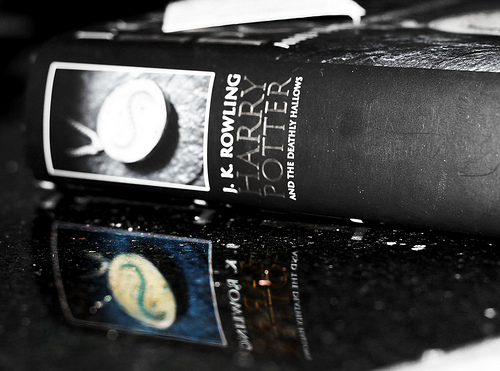
"Ron you know full well Harry and I were brought up by Muggles!" said Hermione. "We didn’t hear stories like that when we were little, we heard ‘Snow White and the Seven Dwarves’ and ‘Cinderella.’"
"What’s that, an illness?" asked Ron.
Harry Potter and the Deathly Hallows, chapter 7
In the final book of the Harry Potter series, Dumbledore has left in his will a volume of children’s fairy tales from the Wizarding world to Hermione, who would be unfamiliar with them having come from a Muggle family. She needed to know these stories to understand the larger Wizarding Culture and to find the Deathly Hallows.
We are experiencing something like that, working with a Chinese student who is reading Harry Potter and the Philosopher’s Stone in English. I knew that there would be times when the book would be difficult because JK Rowling manipulates the English language (and Latin) in the series, like with some of the character’s names and the Mirror of Erised. But there were some things I didn’t anticipate.
One of Myles’ Changping friends has aspirations to attend school in Europe in a few years. He has some special talents, and there is a program for his specialty in a European country that is likewise interested in his applying to it. The language of instruction for the international participants is English, not the home language of the country. His language capability in English is better than most Chinese kids his age, mostly because his parents’ have looked for every opportunity for him to improve his English, sometimes at the expense of his Mandarin.
For the last year, he has come over to our house a few times a week for some extra English practice. One thing that I have considered might help him (inspired by our experience with the Brave Writer program) is listening to books while reading along so he can match what is spoken to how it is written. We follow up with copywork in addition. He’s been listening to Harry Potter and the Philosopher’s Stone on a CD, and sometimes I re-read parts of it to him. Occasionally, when I know the movie matches very closely to the book, we watch a scene from the film in addition to the listening and reading. Even though we have all these tools to help guide our friend through the book, I still sometimes have to translate some of the vocabulary
A Western child, steeped in Grimm’s fairy tales and the like, probably understands the world Harry Potter is thrust into because the basic vocabulary of Rowling’s magical realm is the same that he or she has heard so many times before. Harry’s supply list for his first year includes equipment like a cauldron and a wand, and notes a prohibition on broomsticks for the youngest students. Most Anglophone readers, I’m sure, are able to visualize what these things might look like because we’ve already heard so many other stories where witches and wizards have cauldrons and wands, and travel by flying broomsticks. For Myles’ friend, on the other hand, he needed a lot more explanation about what these things were.
I started translating some of these words using the Pleco app on my phone. Cauldron was a particular problem, especially since Mandarin has many words for cauldron, and Chinese witches apparently don’t use them. Fortunately, one of the databases that Pleco uses give a clue to the Chinese word that is appropriate for the vessel in which a magical person might brew a potion.
I may have failed him in not really delving into the names that Rowling chose for people and places, like Draco Malfoy or Diagon Alley. This is a delicious part of the whole series, a lovely treat. However, our friend’s attention waned when I delved into it, so I switched gears. The primary goal was for him and his parents was for him to get through the book, understand it on some level, and realize some improvement in his English.
One thing that I started to wonder, though, through this exercise, is that if Chinese students wouldn’t be further ahead studying Latin, rather than English, as their first second language. The downside would be that, of course, there are no children’s shows in Latin, not many books in Latin, or any opportunities to practice on strangers in the park. However, the way in which English is most frequently taught and tested in China, it doesn’t lend itself to conversation ability. If they are only going to emphasize reading and writing, maybe learning Latin is the way to go in the earlier years. It would lay a good groundwork to understanding a wider variety of European languages. They could differentiate later into something more modern and useful, but at least Latin would provide the base code.
Our friend happily finished Harry Potter and the Philosopher’s Stone. I looked through Brave Writer’s archives and found Encylcopedia Brown Boy Detective. I think this will be a good next lesson for him since he has devoured all of Myles’ books in this series already. It will be most useful for the grammar lessons, without the added work of working through the background knowledge most Western children would bring to the reading.
This post first appeared on Jennifer Ambrose’s site on February, 2014.
Jennifer Ambrose hails from Western Pennsylvania and misses it terribly. She still maintains an intense devotion to the Pittsburgh Steelers. She has lived in China since 2006 and is currently an at-home mother. With her husband Randy and children Myles and Brigid, she resides outside the Sixth Ring Road in Changping, northwest of Beijing.
Photo courtesy of Anders.Bachmann (flickr)



